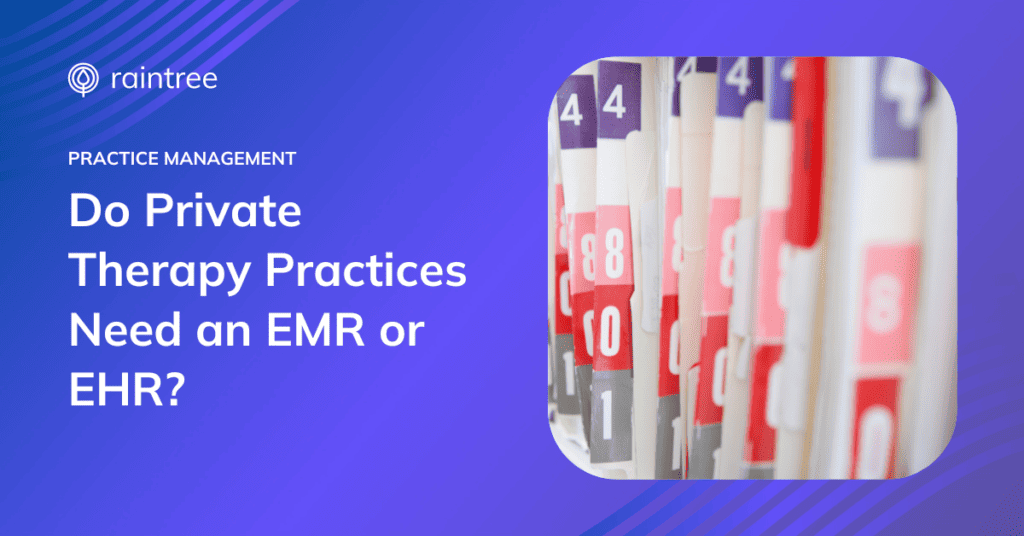Editor’s Note: The Center for Medicare & Medicaid Services (CMS) released the 2024 Physician Fee Schedule Final Rule, which ended automatic reweighting of the Promoting Interoperability performance category for PT, OT, and SLP clinicians. Notable changes include a requirement to use certified EHR technology (CEHRT).
A robust EMR or EHR system is an asset to any healthcare organization; however, it is especially critical for private therapy and rehab practices, where storage, access, and quick sharing of patient data are paramount for delivering excellent clinical experiences.
A robust EMR or EHR system is an asset to any healthcare organization; however, it is especially critical for private therapy and rehab practices, where storage, access, and quick sharing of patient data are paramount for delivering excellent clinical experiences.
Join us as we review the valuable features that various therapy specialties look for in practice management software as well as address the specific necessities of an EMR or EHR for private therapy practices.
What's the Difference Between EMR and EHR Software?
Although the terms are often used interchangeably, an electronic medical record (EMR) is slightly distinguishable from an electronic health record (EHR).
In fact, an EMR is comparable to a patient’s chart, containing individual medical history, diagnoses, prescriptions, and previous treatments. It allows for better data tracking, timely reminders, patient follow-up, and improved quality of care. EMR systems are databases that store these records.
On the other hand, an EHR system not only houses the patient’s records, but also facilitates interoperability (easy sharing of information between different systems) and may provide other valuable tools to help determine treatment options.
What is Practice Management Software?
Practice management (PM) software is designed to help manage other daily financial and administrative operations. Some functions of therapy practice management software include:
- Generating and tracking patient records.
- Scheduling patient appointments.
- Processing payments, submitting insurance claims, and performing other medical billing procedures.
So with all of that in mind, the benefits are clear! A practice management software together with a powerful EMR can lead to optimized productivity, streamlined revenue cycle management, and better yet—more personalized patient engagement.
Basic Requirements for a Rehabilitation Therapy EMR or EHR
Is utilizing an EHR mandatory for private therapy and rehab practices? No, but using a certified EHR can provide many important benefits when compared with specialized EMR systems.
One important factor to consider is compliance with federal reporting and incentive programs, like the Merit-Based Incentive Payment System (MIPS). As of January 1, 2024, MIPS eligible clinicians who provide rehabilitation therapy services (including PT, OT, and SLP) are no longer eligible for automatic reweighting of the Promoting Interoperability performance category. Notably, the Promoting Interoperability category requires the use of certified EHR technology.
Additionally, using a secure EHR system can help therapists achieve mandated compliance with the Health Information Portability and Accountability Act (HIPAA)! According to the U.S. Department of Health and Human Services, private therapy practices are at the top of the HIPAA non-compliance list, which often attracts heavy penalties.
On the broadest level, using a certified EHR platform can provide a secure, care-focused platform for maintaining and organizing patient records and industry-leading compliance.
How Do Therapy And Rehab Practices Benefit From EMR Platforms?
Any high-value EMR software will deliver many useful features beyond clinical documentation capabilities, some of which are vital to the success of various therapy and rehab practices. Here’s how physical therapists, occupational therapists, speech-language pathologists (SLPs), and applied behavioral analysis (ABA) providers can benefit from an EMR or EHR.
EMRs for Physical Therapy and Occupational Therapy
Physical and occupational therapists often work with patients who are unable to attend in-office appointments. An EMR system that offers virtual appointment options, such as telehealth, can offer continuity of care to patients that cannot leave their homes or who live in medically underserved areas. With real-time communication tools and automated engagement, therapists can easily adjust recommended exercise regimens as well as collect patient feedback, all of which reduce costs and conserve time.
Additionally, EMRs that feature data-driven automation may come with built-in current procedural terminology (CPT) codes, streamlining the navigation of tricky federal payor requirements, such as Medicare billing for group therapy sessions.
EMRs for Speech-Language Pathology
Speech-language pathology heavily depends on progress-tracking in order to provide their patients with the highest quality of care. So an EHR that offers in-depth clinical documentation with insightful business intelligence tools would be ideal for SLPs and speech therapists who want to be able to analyze patient progress, boost patient engagement, and promote better outcomes.
EMRs for Applied Behavior Analysis (ABA)
Also called behavioral engineering, ABA is a therapy specialty that helps modify behavior to improve healthy social interactions as well as better manage cognitive disabilities. And since it is often geared toward younger patients, ABA EMRs call for unique features that can sometimes be difficult to find for pediatric outpatient therapy, such as:
- A parent portal. A patient portal built to accommodate parents or legal guardians with features that allow for authorized representatives as well as third-party appointment summaries.
- Non-traditional billing services. Payroll management that caters to a variety of payment models; ideal for ABA providers who need to track their services during school-based therapy.
- Platform integration with other specialties. Since ABA often overlaps with other forms of pediatric therapy, there is a need for streamlined referral tools and the ability to share accurate medical records across practices easily.
Raintree's All-In-One EMR Platform
Here at Raintree, we are continually innovating and take pride in offering the most flexible, powerful EMR software for therapy and rehab practices. From interactive reporting and automated billing to clinical documentation and patient engagement, our all-in-one platform helps therapy providers of any specialty foster real relationships with their patients and fuel their practice’s exponential growth.


